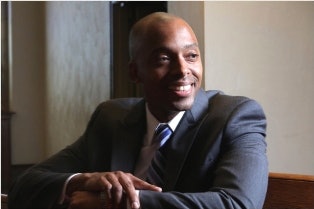 Dr. Khalil Gibran Muhammad, director of the Schomburg Center for Research in Black Culture in Harlem, was the keynote speaker.
Dr. Khalil Gibran Muhammad, director of the Schomburg Center for Research in Black Culture in Harlem, was the keynote speaker.PHILADELPHIA — Atiya S. Strothers knows that many people view her as an unlikely doctoral candidate.
Strothers, 30, grew up in a low-income, single-family household in the heart of Philadelphia and is the first in her family to attend and graduate from college.
“I’m not supposed to be here,” said Strothers, who is now in her third year as a doctoral student at the Rutgers University Graduate School of Education. “I don’t fit the idea of someone getting a Ph.D.”
Strothers has shattered the stereotype and is well on her way to achieving her career goals; she hopes to defend her dissertation next year and land a teaching job at a top-notch university. Then she wants to give back and help other young Black students go on to graduate school.
Strothers gathered this past weekend with nearly 350 other participants at the 2nd Annual Black Doctoral Network Conference in Philadelphia. This year’s theme was “Making the Connection” and conference organizers encouraged participants to network and forge new relationships with other scholars engaged in research across the country.
For Strothers, the opportunity to converse with other doctoral students who are going through the rigorous process of writing their dissertation was particularly gratifying.
“The biggest thing that stood out for me was seeing scholars across various disciplines and seeing people who look like me,” she said. “Sometimes it feels like you are the only one doing the work. The interdisciplinary nature of the conference gave me multiple things to start to think about and helped me to realize that I can learn from what others are doing.”
That kind of deep reflection is what organizers of the three-day conference had in mind when they first formed the network last year. Since then, they have been successful in convincing prominent scholars like Drs. William Julius Wilson, Julianne Malveaux, Lawrence Bobo and Boyce Watkins to serve on its board of directors.
Dr. Khalil Gibran Muhammad, director of the Schomburg Center for Research in Black Culture in Harlem, was this year’s keynote speaker and Philadelphia’s Mayor Michael Nutter was on hand to extend greetings.
At a time when many Black and Latino doctoral students say that they feel isolated as they navigate academia, the Network is designed to provide support for these emerging scholars.
This year’s conference provided workshops on how to launch an academic job search and featured panel sessions on a range of topics from mentorship to non-academic careers for newly minted graduates.
Deandra S. Taylor, conference chair of the Network, said the overall membership of the organization has swelled to about 4,000 members and plans are underway to establish regional chapters across the country.
This year’s conference also included undergraduate students, with the hope of creating a direct pipeline to get them to consider graduate school sooner rather than later.
“I think the conference was a great success,” said Taylor. “It was exciting to see so many scholars in attendance.”
For Strothers, whose dissertation is an oral history project that examines access, equity and the diversity pipeline to the doctorate through the eyes of the Reverend Dr. Samuel Proctor — the famed educator and Baptist preacher — the conference provided her the momentum needed to push forward to the finish line and then reach back and pull others up with her.
“By me being Black, I want to get to the table to help others like me,” she said with a smile. “We all have that responsibility.”
Jamal Watson can be reached at [email protected]. You can follow him on Twitter @jamalericwatson.

![Mentor Mentee [60287]](https://img.diverseeducation.com/files/base/diverse/all/image/2024/04/Mentor_mentee__60287_.662959db8fddb.png?auto=format%2Ccompress&fit=crop&h=100&q=70&w=100)



















